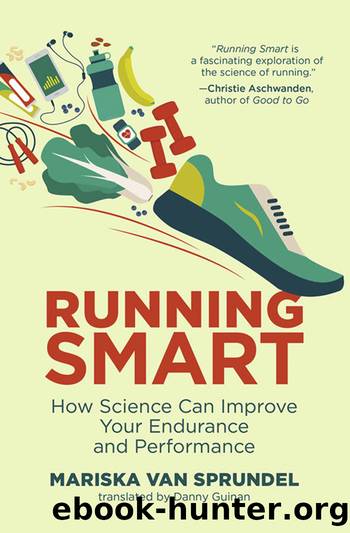Running Smart by Mariska van Sprundel

Author:Mariska van Sprundel [van Sprundel, Mariska]
Language: eng
Format: epub
Tags: science behind running; running injury; running shoes; athletic performance; sports nutrition; psychology of running; mental and physical health; endurance; running technique; scientific evidence
Publisher: MIT Press
Published: 2021-08-24T00:00:00+00:00
The list of supplements does not stop at beetroot juice. What about magnesium, iron, sodium bicarbonate, and vitamin pills? What can we say about these? With regard to iron and magnesium, sports dietician Jenny Hofstede says that there is no evidence to suggest that it improves performance as long as the athlete is not suffering from a deficiency. Some runners take magnesium in the belief that it helps prevent cramps. This has never been proven. âSports-related muscle cramp is often the result of a lack of fluids or suddenly deciding to run much longer distances,â according to Hofstede. Iron deficiency and anemia are common among athletes. However, taking extra iron is necessary only if you still lack the mineral despite making iron-enriching adjustments to your diet.
Itâs a bit more complicated when it comes to sodium bicarbonate (also known as baking soda). Bicarbonate works as a buffer against lactic acid in the muscles when taking intensive and explosive physical exercise that lasts no more than a few minutes. Imagine you are running a one-mile race. Your leg muscles acidify when the lactic acid produced is converted into lactate and a H+ ion, with the latter being the main culprit. Acidification causes the enzymes in the muscles to work less efficiently, which has a dramatic effect on performance. Bicarbonate neutralizes everything by removing the H+ ions. Athletes also like to use the supplement beta-alanine because of its alleged buffering properties. Supplements that buffer lactic acid are most effective in the case of explosive sports, like sprinting. They are of little use to the average marathon runner, who rarely suffers from acidification.
What about vitamin supplements? I know people who take multivitamins every day because they think âWhatâs the harm?â Trainers sometimes advise their athletes to take extra vitamins as a preventative measure. It is true that you need more vitamins and minerals when you train hard, says Hofstede, but you should be able to get all you require out of a proper, balanced diet. There is also no point in taking vitamins when your vitamin status is already good; more pills will not improve your performance. In fact, taking too many vitamins can be harmful. Experts advise against exceeding the RDI, which is exactly what happens when you take certain vitamin pills. Take a quick look at the shelves in any drugstore and you will see that some pills contain 1,000 mg of vitamin C. The equivalent of eating three melons! In the Netherlands, the RDI for vitamin C for adults is 75 mg per day. A single 1,000 mg pill, therefore, will give you over ten times more vitamin C than you actually need. Most people donât give this a momentâs thought. Nor do they realize that too much vitamin C can increase the risk of kidney stones, or that an overdose of vitamin B6 can lead to pain and sensation disorders. In 2010, the Dutch speed skater Sven Kramer suffered nerve damage to his right legâthe result, according to medical experts, of swallowing sixteen times the RDI of vitamin B6.
Download
This site does not store any files on its server. We only index and link to content provided by other sites. Please contact the content providers to delete copyright contents if any and email us, we'll remove relevant links or contents immediately.
Shoe Dog by Phil Knight(4162)
The Rules Do Not Apply by Ariel Levy(3905)
Walking by Henry David Thoreau(3234)
Running Barefoot by Amy Harmon(3056)
Crazy Is My Superpower by A.J. Mendez Brooks(2858)
How to Read Water: Clues and Patterns from Puddles to the Sea (Natural Navigation) by Tristan Gooley(2851)
I'll Give You the Sun by Jandy Nelson(2842)
How to Read Nature by Tristan Gooley(2664)
How Music Works by David Byrne(2524)
The Boy, the Mole, the Fox and the Horse by Charlie Mackesy(2446)
Seducing Cinderella by Gina L. Maxwell(2233)
Cuba by Lonely Planet(2184)
The Fight by Norman Mailer(2158)
Going Long by Editors of Runner's World(1920)
Accepted by Pat Patterson(1917)
The Unfettered Mind: Writings from a Zen Master to a Master Swordsman by Takuan Soho(1859)
The Happy Runner by David Roche(1819)
Backpacker the Complete Guide to Backpacking by Backpacker Magazine(1815)
Trail Magic by Trevelyan Quest Edwards & Hazel Edwards(1760)
